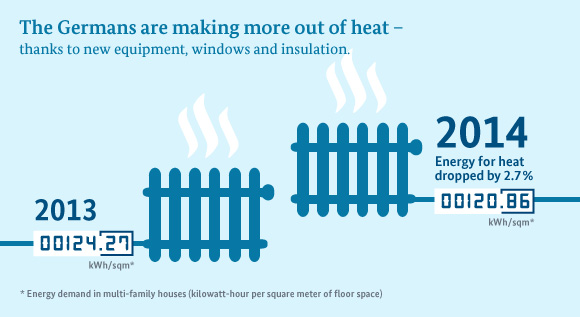The heat transition is making progress
In 2014, households in Germany consumed 2.7 per cent less energy for heating than in the year before. Buildings continue to offer potential for higher energy efficiency: most of the housing in Germany has only been partly modernised, if at all.
 © BMWi; Data from “Wärmemonitor Deutschland 2014” of the DIW Berlin and ista Deutschland GmbH
© BMWi; Data from “Wärmemonitor Deutschland 2014” of the DIW Berlin and ista Deutschland GmbH
People need to use the right heating system if they are to be energy-efficient: For example, many of the heating pumps in use are outdated. New, efficient heating pumps and an optimisation of the entire heating system can save a lot of energy - a major advance for the energy transition. For this reason, people have started talking about the “heat transition” with regard to energy-saving heating.
Studies by the German Institute for Economic Research (DIW Berlin) show that progress is being made. In 2014, households in Germany consumed 2.7 per cent less energy for heating than the year before. Provisional figures indicate that the average energy requirement in multi-family houses stood at 121 kWh per square meter in 2014. The 2013 figure had been 124.
Modernise well and save plenty
There are several reasons why the energy demand has dropped. The main causes are new, efficient heating systems and windows, and better insulation. So modernising well saves plenty of money. And there is every prospect that this can continue. The energy performance of many of the 19 million or more residential buildings here has only been partially improved - if at all - and the same goes for the more than three million non-residential buildings. Overall, buildings consume nearly 35 per cent of total final energy in Germany. Maintenance work will need to be done sooner or later on very many of them. In fact, over the next 20 years, roughly half of all buildings in Germany will need to be modernised. So why not improve the energy performance at the same time and become part of the energy transition?

